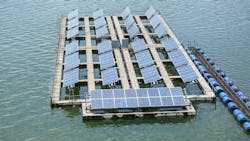Report: Japan to nearly achieve 2030 renewable power generation target
Offshore staff
LONDON — Japan is focusing on the rapid development of renewable energy to fill the void created by the Fukushima nuclear power plant disaster, a recent GlobalData report stated. Japan released the Sixth Strategic Energy Plan in October 2021, which increased the country’s renewable power (including hydropower) generation target from the previous 22-24% to 36-38% by 2030.
As per the current trend, renewable power is set to account for 34.6% of the generation mix in 2030, which is close to the target, according to GlobalData.
Attaurrahman Ojindaram Saibasan, GlobalData power analyst, explained, “Historically, the proliferation of renewable power projects has been hindered by the difficulty of getting such projects connected to the grid. Since the grid is in the hands of various local utilities, connection charges are high. This is compounded by the fact that the rules for setting up renewable projects are cumbersome, and it takes three or four years to clear all regulatory hurdles. Very few developers have sufficient funds or patience to see their projects through this process.”
Consequently, the government has decided to reduce the waiting period for the approval of renewable power projects to less than two years.
In addition, the establishment of a centrally operated grid may finally allow renewable projects to be set up faster, encouraging the sector to grow into a significant part of Japan’s power network. The implementation of an approval process for renewable projects through auctions will hopefully change the system and increase the speed at which projects are commissioned.
Saibasan said, “Another challenge that the country faces about the renewable sector’s expansion is a lack of space. Japan’s quest to replace thermal power with renewables will not be possible mainly because it will need to cover virtually all its free land with solar panels to fully power the country.
“Offshore wind is an option, and the country is also experimenting with floating solar power. These resources were expensive but are now more economical with improvements in technology. Again, Japan’s efforts to implement a public tendering system to approve new renewable power projects will be able to take advantage of the falling prices of newer technologies.”
08.11.2022
